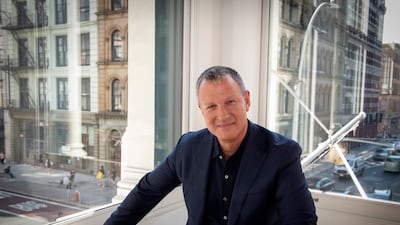In 2020, Erel Margalit led the first Israeli tech delegation to the UAE. He is clearly still moved by the occasion.
The visit gave him hope about the possibility of a more peaceful Middle East driven by entrepreneurs.
Mr Margalit is a former politician and founder and chief executive of JVP, one of Israel's largest venture capital firms.
On the third anniversary of the Abraham Accords – the normalisation agreements signed between Israel and the UAE and Bahrain on September 15, 2020 – he spoke to The National about the pact's significance.
“The Accords is one of the biggest changes for Israel in the past 50 years,” he said.
“The agreements we had with Egypt and Jordan were very important from a security standpoint. But they really didn’t yield much economically.”
During the 2020 trip, Mr Margalit gave his first interview to an Emirati outlet, an experience he comes back to throughout his conversation with The National.
“For us Israelis, after reaching New York, London, Paris and Asia the place that we were longing to reach is so close to home. Our own region,” he told the host of Dubai TV at the time, in front of a backdrop featuring the Burj Khalifa and Abu Dhabi’s skyline.
His delegation also took the chance to show parts of the Arab world a side of modern Israel that had largely been hidden to the region.
In Israel, the tech sector represents not just an industry, Mr Margalit says, but an irreplaceable part of the country’s modern story, in which brainpower propelled a small country with a hugely troubled early life into an ascendant modern economy.
When he came to the UAE, he was not simply going as a businessman, but as an ambassador representing the “start-up nation” to another of the region’s most tech-focussed countries.
He was there to build on a new vision of the Middle East in which Israel, after more than 70 years of existence, finally engaged with some of its Arab neighbours on friendly terms.
Mr Margalit says the UAE-Israel trade relationship, which was worth $2.5 billion in 2022, exposes Israel to many parts of the world.
“The UAE is not only a great place and market with great people and ideas. It is also a small country that has great reach into the region," he said.
"You might be working with your partners in the Emirates, only to suddenly find yourself in dialogue with Malaysia, Indonesia, India or Saudi Arabia.
“We called it in my interview with Dubai TV the power of ‘yalla’,” he says, using a rousing Arabic term that translates roughly to “let’s go”.
Trade with the Emirates has also helped efforts to bridge the divide between Israelis and Palestinians, he added.
“I think one of the things that has always made our company JVP different is that we involve Palestinians in our operations,” Mr Margalit said.
The Abraham Accords vindicated that all too uncommon approach.
“Having Palestinians on board helped us in this new phase, because so much of our activity in the region requires people who understand Middle Eastern culture,” he said.

There is still work to do, Mr Margalit believes, and Israel's new government is not helping.
In power for less than a year, the coalition has divided Israeli society with deeply controversial judicial reforms.
It is by far the most right-wing coalition in the country’s history, containing a number of ministers with a history of anti-Arab hate. It has often drawn stern international rebuke, including from Abraham Accords partners.
Mr Margalit believes this is delaying progress on the vitally important drive for normalisation with Saudi Arabia, which ironically is one of Prime Minister Benjamin Netanyahu’s biggest goals.
“Regarding Saudi Arabia, I think the business leadership is in front. Eventually the political leadership needs to catch up,” he said.
“I think it will take a new approach within Israel. It will take a government that knows how to connect people rather than set them apart. A government that can identify the goodwill created from business, but that understands it’s only an opening,” he adds.
In the studio of Dubai TV, three years before Israel found itself in its current internal crisis, Mr Margalit kept going back to the attitude that he believes will overcome the region’s many difficulties.
"Remember throughout history, every time there was a crisis, we came up with ideas that were larger than the ones we had when we came into the crisis," he said.
"We have to work together in order to make this work. So I say again, yalla!”
Today, in less optimistic times, the “yalla” attitude that formed the basis of his enthusiasm in 2020 is still there, but he lays it out in more sobering terms and with more urgency.
“The alternative is tearing people apart, and that’s a dangerous game in the Middle East,” the businessman said.


